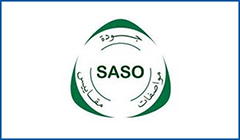
In fact, many of the SASO standards are based on the safety standards of international organizations such as the International Electro-technical Commission (IEC). Like many other countries, Saudi Arabia has added some unique items to its standards based on its own national and industrial voltages, geography and climate, and ethnic religious practices. In order to protect consumers, the SASO standard is not only for products imported from abroad, but also for products produced in Saudi Arabia.
The need for SASO certification
The Saudi Arabian Ministry of Industry and Commerce and SASO require all SASO certification standards to include SASO certification when entering Saudi Customs. Products without a SASO certificate will be refused entry by Saudi Port Customs.
The products are exported to Saudi Arabia. The SASO certificate is issued when the goods enter the customs. The technicians of the Saudi Arabian Standards Organization will check the certificates. If the SASO certificate cannot be issued, the products will be refused entry or sampling to the Ministry of Industry and Commerce of Saudi Arabia or The laboratory of the Saudi Arabian Standards Organization conducts tests. If the test fails, the products will be refused entry, and all costs will be borne by the exporting enterprise.
SASO certified product range
The SASO certification covers all products used by adults and children in residences, offices or entertainment venues, all motor vehicles and spare parts, and construction products. These products can be mainly divided into the following categories:
Air conditioning SASO, battery SASO, cosmetics SASO, toy SASO, compressor SASO, fan SASO, household appliance SASO, wire and cable SASO, fax machine SASO, lamp SASO, optical power SASO, elevator SASO, generator SASO, office electrical and electronic equipment SASO, PC SASO, Power SASO, Auto Parts SASO, Ceramic SASO, Acoustic SASO, Power Amplifier SASO, Conference System SASO, Mixer SASO
The cities of Saudi Arabia use lower voltages, divided into 127 volts and 220 volts (Riyadh is 235 volts), both at 60 Hz; but in Mecca and industrial areas, higher voltages are used, 220 volts and 380 volts. Two kinds are also 60 Hz. The general household and office are equipped with 110 volts (ie 127 volts) and 220 volts for electrical products of different voltages. Generally speaking, air conditioners and washing machines use 220 volts. Small appliances use 110 volts.
SASO certification application process
Manufacturers who obtain SASO certification and export products to Saudi Arabia require the following steps:
Apply to the consulting company, and the consulting company informs the company of the product certification procedure according to the product category and in accordance with the requirements of SASO;
The company submits product samples for testing according to the certification procedure, and some products (such as some motor vehicles and accessories) need to be inspected by the factory;
After passing the product inspection, the enterprise obtains the SASO certification; if the product fails the test, the enterprise will get a detailed explanation.
SASO certification type
1. Pre-shipment Compliance Verification
This method is best for exporters or manufacturers with very few shipments. Before shipment, you need to apply for pre-shipment inspection (PSI) and pre-shipment test (PST). A CoC certificate is available if both are qualified.
Second, product registration (Registration)
This method is suitable for the vast majority of customers. Its advantage is that each shipment inspection (PSI) is necessary, but each shipment does not need to be pre-shipment test (PST). The Client can obtain a Registration Qualification Statement (SfR) by submitting a declaration of compliance and providing a test report in accordance with the importing country and relevant international or national standards, and stating that the product has met the basic requirements and national differences of the importing country.
Type Approval Licensing
This method can save the inspection fee or test fee before each shipment, simplify the repeated application process, and guarantee the delivery time. Therefore, it is a part of the shipment is more frequent or larger, and the quality and reputation are emphasized. The company favors. The product of the exporter or manufacturer can only obtain the Statement for Licence (SfL) certificate if it is fully compliant with the mandatory standards of the importing and exporting country. The certificate is valid for one year. It is required to submit an updated factory inspection report and pay an annual fee before it expires and can be renewed after being reviewed by RLC. Products that receive the SfL certificate no longer need to be pre-shipment inspection (PSI) for each shipment, and are reduced to a few few inspections per year (typically 2-3 times per year, depending on product status).
The test is based on the SASO/PAI standard or the IEC standard + country difference. The SASO/PAI standard requirements must be considered separately. Some of the terms are quite different. The Saudi Arabian rated voltage is 220V, 50/60Hz (with BS plug) or 127V, 60Hz ( With UL plug) (additional prototype is required for testing); Kuwait voltage is 240V, 50Hz (with BS plug).
Types of certification requires factory inspection;
For electrical products exported to Saudi Arabia, the rated frequency marked on the product must include 60 Hz;
The user manual for air conditioning for export to Saudi Arabia must be in Arabic and English; audio and video products, user manual must be in Arabic;
The original safety and EMC report must be a report issued by an accredited laboratory within 2-3 years.
NTEK advantage
NTEK is a professional agency SAA certification body, National CNAS Authorized Laboratory (L5516). NTEK has a team of experienced SAA certification experts who can provide you with SAA certification solutions one-on-one. It has the strength to provide a full range of one-stop testing and certification services for customers' products to obtain national certification, and help your products sell well all over the country.
Free question answering line:
0769 23301618
Any questions about testing and certification, we will give you the full answer, service to your satisfaction!
Tel:+8617722308370
Email:abel.zhang@gdntek.org.cn
skype:13790184018
